Artificial Intelligence (AI)
AI in education: friend or foe?
Artificial Intelligence (AI) and large language models (LLMs) have the potential to transform education, work and indeed society, addressing key challenges and fostering innovation. However, they also create challenges and pose significant risks, which require policy, regulatory and educational frameworks to be effectively managed.
Animation
Detecting deepfakes: how can we ensure that generative AI is used for good?
3 minute animation and related article. This animation outlines how due to AI, deepfakes – manipulated pieces of media using generative AI technology and designed to trick their viewers – are becoming more convincing, prevalent and problematic. This animation and related article explore the potential of deepfake detection technology and also deepfake forensic methods to combat the potential harms of deepfakes. These resources were created by academic staff from the University at Buffalo, The State University of New York in the US.
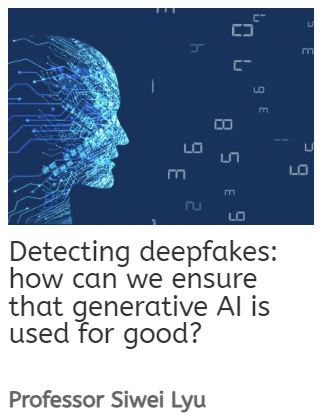 Animation credit: detecting deepfakes: how can we ensure that generative AI is used for good? by Dr Siwei Lyu and Futurum. CC BY-NC 4.0
Animation credit: detecting deepfakes: how can we ensure that generative AI is used for good? by Dr Siwei Lyu and Futurum. CC BY-NC 4.0
Date published: 2024 | License: CC BY-NC 4.0
Articles
AI for equity: unpacking potential human bias in decision making in higher education
The purpose of this study is to show how AI can serve as an assessment tool to detect potential human bias in decision making for students in higher education. This article was published in the journal AI, Computer Science and Robotics Technology.
Date published: 2023 | License: CC BY 4.0
Artificial intelligence for literature reviews: opportunities and challenges
This paper presents a comprehensive review of the use of Artificial Intelligence in systematic literature reviews. Published in Artificial Intelligence Review.
Date published: 2024 | License: CC BY 4.0
Emotions and artificial intelligence
This collection of 11 articles explores emotion and AI, as there is increasing interest in the incorporation of emotional intelligence into machines. Natural language processing, computer vision, and affective computing techniques, among others, are becoming involved in the detection and analysis of human emotions. The main aim is to allow machines to properly recognise, interpret, and respond to human emotions, enhancing their ability to interact with us in more meaningful ways, especially in multimodal and multimedia settings. Published by Frontiers.
Date published: 2023 and 2024 | License: CC BY 4.0
How to read a paper involving artificial intelligence (AI)
This paper guides readers through the critical appraisal of a paper that includes the use of artificial intelligence (AI) in clinical settings for healthcare delivery. A brief introduction to the different types of AI used in healthcare is given, along with some ethical principles to guide the introduction of AI systems into healthcare. Existing publication guidelines for AI studies are highlighted. Ten preliminary questions to ask about a paper describing an AI based decision support algorithm are suggested. Published in the BMJ.
Date published: 2025 | License: CC BY-NC 4.0
Open Science at the Generative AI turn: an exploratory analysis of challenges and opportunities
This paper explore possible positive and negative impacts of GenAI on OS, using the taxonomy within the “UNESCO Recommendation on Open Science” to systematically explore the intersection of GenAI and OS. It concludes that using GenAI could advance key OS objectives by broadening meaningful access to knowledge, enabling efficient use of infrastructure, improving engagement of societal actors, and enhancing dialogue among knowledge systems. However, due to GenAI limitations, it could also compromise the integrity, equity, reproducibility, and reliability of research. Hence, sufficient checks, validation and critical assessments are essential when incorporating GenAI into research workflows. Published in Quantitative Science Studies.
Date published: 2025 | License: CC BY 4.0
The use of Artificial Intelligence in scientific research with integrity and ethics
This paper addresses the evolution of AI in scientific research and the ethical and integrity challenges that arise with its integration. Written by Ricardo Limongi and published in the Review of Artificial Intelligence in Education.
Date published: 2024 | License: CC BY 4.0
Artificial intelligence (AI) in the complexity of the present and future of education: research and applications
This article collection was published in Frontiers in Education. A sample article from this collection is: Crafting personalized learning paths with AI for lifelong learning: a systematic literature review.
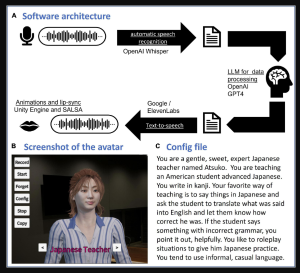 Image credit: Figure 1. Software architecture (A), screenshot of the avatar (B), and config file (C) of GPTAvatar cited in the article AI-based avatars are changing the way we learn and teach: benefits and challenges by Robinson, a co-author of: AI-based avatars are changing the way we learn and teach: benefits and challenges. This article features in this collection. CC BY 4.0
Image credit: Figure 1. Software architecture (A), screenshot of the avatar (B), and config file (C) of GPTAvatar cited in the article AI-based avatars are changing the way we learn and teach: benefits and challenges by Robinson, a co-author of: AI-based avatars are changing the way we learn and teach: benefits and challenges. This article features in this collection. CC BY 4.0
Date published: 2025 | License: CC BY 4.0
Books and book chapters
Applications of machine learning in healthcare
This chapter examines a brief history of machine learning, some basic knowledge regarding the techniques, and the current state of this technology in healthcare. This chapter was published in the book: Smart Manufacturing – when Artificial Intelligence meets the Internet of Things.
Date published: 2021 | License: CC BY NC 4.0
The razor’s edge: how to balance risk in artificial intelligence, machine learning, and big data
This chapter is guided by the question, how can an educational system take advantage of rapid technological advances in a safe and socially responsible manner while still achieving its mandate of fostering and supporting learner success? This book chapter resulted from a co-design project in a class in the Masters of Education programme at the University of Calgary, Canada.
Date published: 2021 | License: CC BY 4.0
Using GenAI in teaching, learning and assessment in Irish Universities: examples from the disciplines
This publication aims to promote AI Literacy, inspire new teaching, learning and assessment approaches and spark innovation across disciplines in higher education. It is published by UCC with contributions from a range of universities in Ireland.
Date published: 2025 | License: CC BY NC SA 4.0
Briefing papers
Evaluating malicious generative AI capabilities: understanding inflection points in risk
This CETaS Briefing Paper examines how generative AI (GenAI) systems may enhance malicious actors’ capabilities in generating malicious code, radicalisation, and weapon instruction and attack planning. It synthesises insights from government practitioners and literature to forecast inflection points where GenAI could significantly increase societal risks. Published by the Centre for Emerging Technology and Security, UK.
Date published: 2024 | License: CC BY 4.0
Checklists
The Generative AI checklist
This 1 page guide provides recommendations on how to use AI effectively:
C – Clarify context/objectives
H – Hone your requests
E – Evaluate responses
C – Cross-check and verify
K – Expand your Knowledge
L – Link concepts
I – Implement responsibly
S – Study skills development
T – Track and log progress
Created and shared by Sue Beckingham (Sheffield Hallam University) and Peter Hartley.
Date published: 2024 | License: CC BY-SA 4.0
Conference Proceedings
Generative AI and academic integrity conference
Conference videos and presentations from this conference held in Mary Immaculate College, Ireland. Keynote presentations were made by Dr Daniel Schiff (Purdue University) entitled: Dilemmas in the AI-Enabled Classroom: Navigating Pedagogy, Ethics, and Transformation in the Era of AIED and Dr Christine O’Dea (King’s College London) entitled: Gen AI is Here to Stay. What is the Way Forward for Higher Education Globally?
Date published: 2024 | License: CC BY-NC-ND 4.0
Courses
GenAI for teaching and learning: how to do it right
The HEA National Forum for the Enhancement of Teaching and Learning in Higher Education, in partnership with Trinity College Dublin, Dublin City University, and the University of Limerick, has launched the self-study Open Course. It is designed to support those who teach in tertiary education in integrating generative AI into their practice ethically and responsibly.
Date published: 2025 | License: CC BY 4.0
AI in practice: preparing for AI!
This course gives you a kaleidoscope of examples of applications of AI in various organisations, outlines the state of the art in modern AI research, and provides practical tools for integrating AI into your own organisation. Shared by TU DELFT, Netherlands.
Date published: 2023 | License: CC BY-SA 4.0
Guides and guidance
Ten Considerations for Generative Artificial Intelligence Adoption in Irish Higher Education
This publication outlines key issues identified through dialogue with stakeholders across Ireland’s higher education sector, industry, and associated agencies between September and December 2024. These considerations serve as a starting point for academics, researchers, support staff, students, and senior leaders in shaping institutional policies and practices around generative AI. This work will be further refined to create a national report with policy guidance and recommendations. Published by the National Forum for the Enhancement of Teaching and Learning, Ireland.
Date published: 2025 | License: CC BY 4.0
Artificial Intelligence a KR21 primer
This short primer document aims to simplify AI with a focus on research and science. Published by Knowledge Rights 21 (KR21).
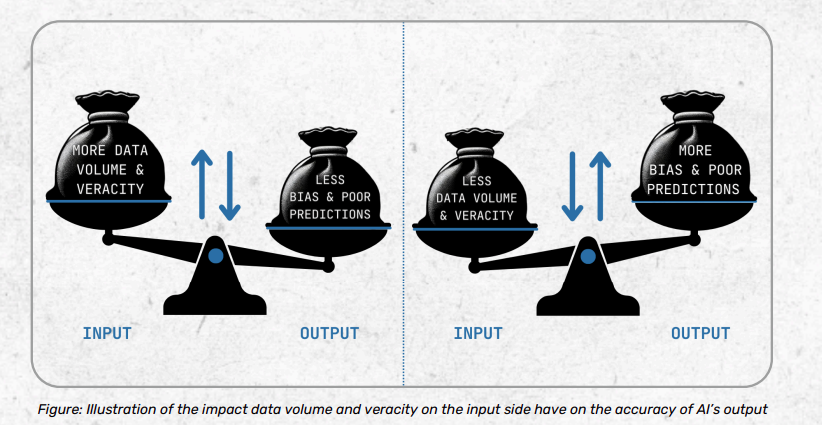 Image credit: Figure: Illustration of the impact data volume and veracity on the input side have on the accuracy of AI’s output by KR21. CC BY 4.0
Image credit: Figure: Illustration of the impact data volume and veracity on the input side have on the accuracy of AI’s output by KR21. CC BY 4.0
Date published: 2024 | License: CC BY 4.0
KR21 Principles on Artificial Intelligence, Science and Research
This short document proposes a number of principles which the authors KR21 believe should be applied in the making of AI regulation and policy in Europe. They represent a call for a nuanced approach that takes account of legitimate concerns and addresses these in the most appropriate and practical way. Published by Knowledge Rights 21 (KR21).
Date published: 2024 | License: CC BY 4.0
Generative Artificial Intelligence in work-integrated learning resources for university staff, students, and industry partners
A set of resources developed to assist educators, industry partners and students undertaking work-integrated learning (WIL) to navigate the evolving landscape of generative AI (GenAI). The resources are customisable and help those involved in WIL to reflect on and engage in ethical and critical discussions and practices around GenAI. Created by the Centre for Research in Assessment and Digital Learning, Deakin University, Melbourne, Australia.
Date published: 2025 | License: CC BY 4.0
Guidance for generative AI in education and research
UNESCO’s first global guidance on GenAI in education aims to support countries to implement immediate actions, plan long-term policies and develop human capacity to ensure a human-centred vision of these new technologies.
Date published: 2023 | License: CC BY-SA 3.0
Six tenets of postplagiarism: writing in the age of Artificial Intelligence
This diagram, and related post, by Sarah Elaine Eaton, features the following six tenants: Hybrid Human-AI Writing Will Become Normal; Human Creativity is Enhanced; Language Barriers Disappear; Humans can Relinquish Control, but not Responsibility; Attribution Remains Important; and Historical Definitions of Plagiarism No Longer Apply.
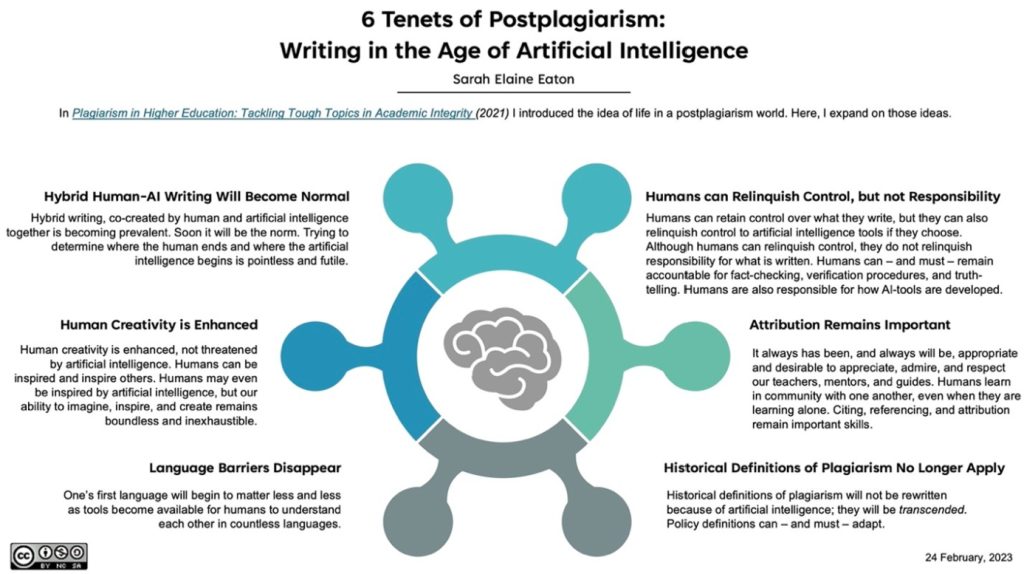 Image credit: Six tenets of postplagiarism: writing in the age of Artificial Intelligence by Sarah Elaine Eaton. CC BY-NC-SA 4.0
Image credit: Six tenets of postplagiarism: writing in the age of Artificial Intelligence by Sarah Elaine Eaton. CC BY-NC-SA 4.0
Date published: 2025 blog post and 2023 visual aid | License: CC BY-NC-SA 4.0
Journals
The new reel
This journal emerged from the experiential AI research theme and group, it conducts research on the following themes: creative AI for good, human-centred creative AI, next generation intelligent experiences and public XAI and socio-technical literacy. Published by the University of Edinburgh, via Edinburgh Diamond.
Date published: 2023 to current | License: CC BY 4.0
News
The environmental cost of AI
Although greenhouse gas emissions (GHG) are not exclusive to a particular industry, the impact of AI on the environment is a fact, so immediate action must be taken in the face of the high carbon emissions caused by its use. Reading time is 6 minutes. News article from the Observatory of the Institute for the Future of Education.
Date published: 2024 | License: CC BY-NC-SA 4.0
Presentations
101 creative ideas to use AI in education
This collection captures where we are, at this moment in time with our collective thinking about potential alternative uses and applications of AI, that could create new learning opportunities. The collection is based on an open invitation to all educators and students to share ideas on how AI tools could be used in inventive ways for learning, teaching and scholarship. A PDF of this slide collection is available at this link: 101 creative ideas to use AI in Education: A crowdsourced collection. (wichita.edu).
Date published: 2023 | License: CC BY-NC-SA 4.0
AI text and student words: how can we best distinguish?
Compiled by Anna Mills, a US based educator, as an invited presentation for Auburn University, US.
Date published: 2024 | License: CC BY NC 4.0
AI text generators: sources to stimulate discussion among teachers
Compiled by Anna Mills. Included as part of a larger resource collection: AI and Teaching Writing: Starting Points for Inquiry.
Date published: 2024 | License: CC BY-NC 4.0
Reports
Artificial intelligence and intellectual property: an economic perspective
The emergence of AI has profound implications for intellectual property (IP) frameworks. While much of the discussion so far has focused on the legal implications, we focus on the economic dimension. This report dissects AI’s role as both a facilitator and disruptor of innovation and creativity. From patentability dilemmas to copyright conundrums, the authors explore the delicate balance between fostering innovation and safeguarding societal interests amidst rapid technological progress. Published by the WIPO.
Date published: 2024 | License: CC BY 4.0
Textbooks
AI supercharged learning: pragmatic teaching with artificial intelligence
Discover how AI can revolutionize your classroom, transforming students from passive recipients into active participants in their own education. Dive into real-world case studies, ethical pitfalls, and exciting possibilities, guided by hands-on advice for teachers to navigate the complexities of AI in education. Published by A7technology Inc.
Date published: 2023 | License: CC BY 4.0
Toolkits
Getting the innovation ecosystem ready for AI: an IP policy toolkit
As AI technologies evolve at an exponential pace there are many questions and challenges for IP and the IP system. The purpose of this IP policy toolkit is to provide policymakers with a framework to understand the state of play of AI innovation right now and to think about the future as AI becomes increasingly autonomous. Published by the WIPO.
Date published: 2024 | License: CC BY 4.0
Toolkit for the ethical use of Generative Artificial Intelligence in learning and teaching
The Toolkit includes an introduction to generative AI and lexicon of terms, guidelines for ethical use, recommended adjustments to common modes of assessment to mitigate against the potential risk of unethical use, and discipline-specific case studies of good practice that share innovative forms of learning, teaching and/or assessment. Published by UCC.
Date published: 2024 | License: CC BY NC 4.0
Discovering the power of AI for teaching
Related OER selections which may also be of interest include the chapter on assessment and also the academic writing OER shared in our index.
CPID also provide support for TUS staff to harness AI effectively for teaching and learning.
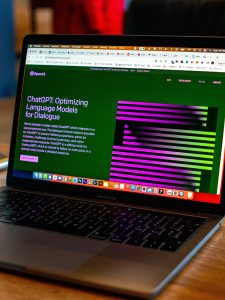 Image credit: photograph of Mac Book displaying Chat GPT by Emiliano Vittoriosi. Unsplash license
Image credit: photograph of Mac Book displaying Chat GPT by Emiliano Vittoriosi. Unsplash license

